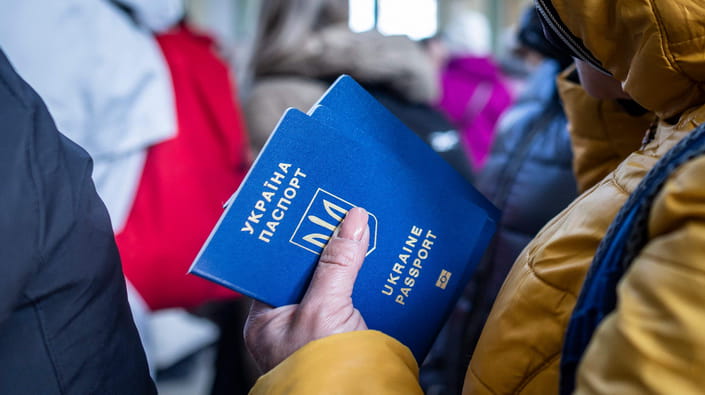67% of Ukrainians surveyed in 7 countries plan to return to Ukraine, of which 35% intend to do so only once the war ends. These are the findings of a survey conducted by Civil Network OPORA among Ukrainians in the UK, Israel, Spain, Germany, the Czech Republic, the USA, Hungary, and the UK.
The majority of respondents (67%) unequivocally state that they plan to return to Ukraine. 12% of them plan to do so in the near future, 20% want to wait. 35% are going to return to Ukraine after the war is over. Most respondents believe that the war in Ukraine will not end soon: 39% think it will be over a year away, 29% think it will be six months to a year.
The desire to return to Ukraine depends on the country in which the respondent lives. For example, Ukrainian migrants in the UK (75%) and the Czech Republic (75%) are willing to return the most. In addition, it is those who moved after February 24, 2022, who mostly want to return (75%), unlike those who moved abroad earlier. Also, young people and the elderly desire to come back to Ukraine the most - approximately 70% of respondents.
For Ukrainian temporary displaced persons abroad (33%), more than the formal lifting of martial law is required to return to Ukraine. Important factors for them are security in the region of their origin and an emotional connection to their homeland, which were chosen by 43% of respondents each. For 38% of respondents, it is important to reconnect with family. At the same time, many respondents also pay attention to social aspects. Thus, for 38%, it is important that they can find a job in Ukraine, and for 25% it is important to have housing. Other strong arguments for returning are having a partner in Ukraine (74%), lack of work in the host country (81%), poor knowledge of the host country's language (88%), and a decrease in income (80%).
55% of respondents said that they used to be more satisfied with life in Ukraine than they are now when they live abroad. Instead, 24% believe that their life has become better abroad. Respondents who moved before the full-scale invasion assessed their life in the new country better than recent migrants. Ukrainians who are currently living in the UK, Israel, and the US are the most satisfied with their lives, while those in Spain and the Czech Republic are the least satisfied.
The majority of displaced persons surveyed agree that Ukraine has a higher level of digital services and less bureaucracy compared to their host country. In addition, they emphasize the higher level of Ukrainian healthcare, which is more about accessibility than quality. The level of education and opportunities to succeed are less praised. Instead, respondents rated the opportunity to find a job as higher in the host country.
Only 16% of respondents said they knew the language of the host country well. The worst situation with knowledge of the local language is among migrants in Hungary and Germany. At the same time, respondents in the UK and the Czech Republic have the best knowledge of the language.
18% of respondents do not plan to return to Ukraine. These are mostly those respondents whose lives have improved significantly in the host country (50%).
The study "Media Consumption, Social and Political Engagement of Ukrainians Abroad" was based on the analytical work of and ordered by Civil Network OPORA. The survey was conducted by Sociological Group "Rating" from April 8 to May 19, 2023 in the UK, Israel, Spain, Germany, the USA, Hungary, and the Czech Republic.
For comments on the research results, please contact us: [email protected]
The study was based on the analytical work of and ordered by Civil Network OPORA. The survey was conducted by Sociological Group "Rating" from April 8 to May 19, 2023 in the UK, Israel, Spain, Germany, the USA, Hungary, and the Czech Republic.
This initiative is implemented by Civil Network OPORA with support from the United States Agency for International Development (USAID). Any opinions expressed in this material are those of OPORA and do not necessarily reflect the views of the United States Government.
